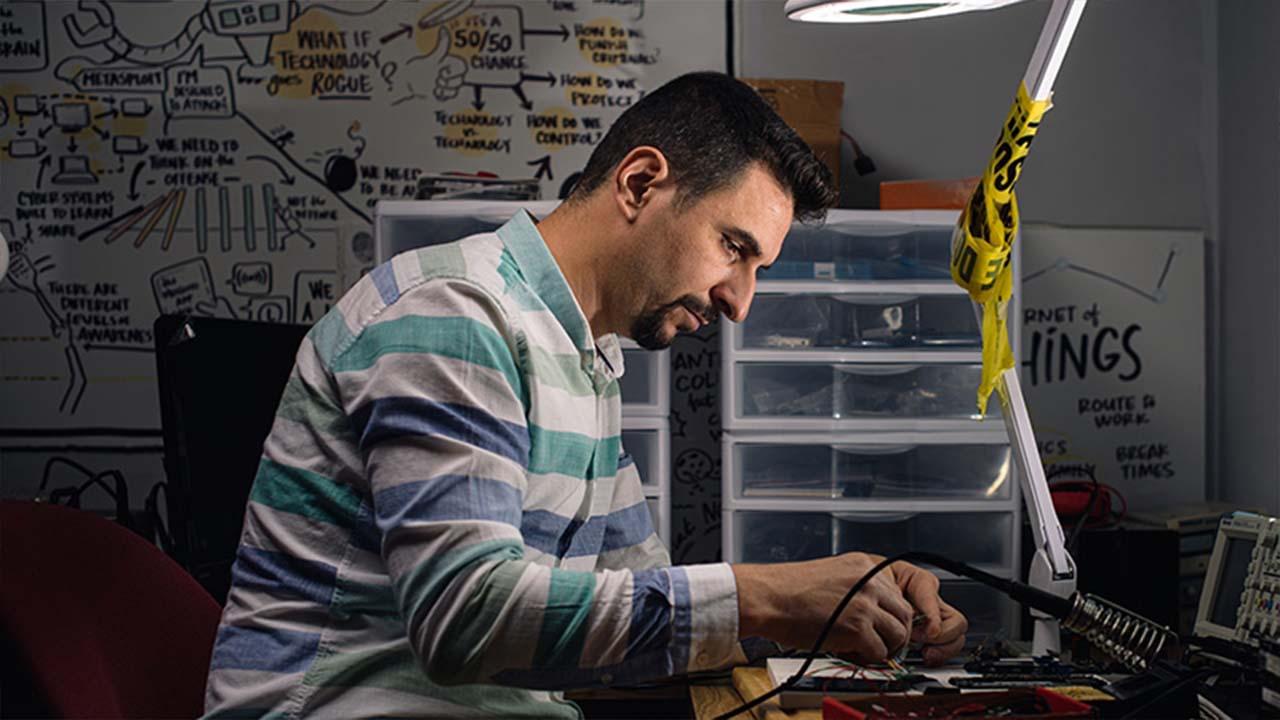Umit Karabiyik, assistant professor of computer and information technology at Purdue University’s Polytechnic Institute, often conducts research inspired by close to 10 years of experience working with law enforcement. Most recently, he has focused on the data that everyday citizens willingly choose to provide to law enforcement — specifically, photos, videos, text messages, and other data from cell phones — and how to collect this data in a way that encourages individuals to assist law enforcement while maintaining personal privacy and security.
Karabiyik believes that most people would like to assist law enforcement in solving a crime, but may hesitate to share everything on their personal devices.
“We want to help, but we also might have images or data on our phones that we do not want to share with others,” explained Karabiyik. “One answer to this dilemma may be an app that allows us to securely and confidently share only what we choose to share.”
Karabiyik’s latest work will target device data sharing when mass incidents take place — when law enforcement asks hundreds of witnesses or victims to provide data related to a specific event, such as a bombing. App-based solutions that allow individuals to consent to and share only certain data from their phones could make it much easier for law enforcement to gain access to the information they need in order to advance an investigation or solve a crime.
Law enforcement apparently agrees with Karabiyik’s approach; he recently received two separate Department of Justice research awards totaling more than $875,000 for projects that include the development of a new mobile device-focused forensics intelligence platform and the creation of a program to leverage the data collected by fitness devices and smartwatches to train criminal justice professionals.
Award: Scalable Multiphone Targeted Data Extraction System
Total funding to date: $600,984
Awarded by: National Institute of Justice, Department of Justice
This project will further develop an existing system, the Targeted Data Extraction System (TDES), originally created to extract case-specific data in a forensically sound manner from the mobile device of willing participants. A new “forensics intelligence” platform will augment TDES with significant new capabilities and will use artificial intelligence (AI) to make the entire platform more effective and practical for law enforcement use. Ultimately, this project will focus on the creation of a scalable, multiphone data extraction system with forensic intelligence capabilities, labeled SM-TDES, with the goal of providing forensic intelligence during mass incidents like the Boston Marathon bombing or the Aurora mass shooting.
“We want to highlight and explore the need to extract data from many phones, concurrently, after an incident that involves many people,” explained Karabiyik. “We also will develop AI-driven analysis capabilities to automatically extract relevant information that will provide viable leads to law enforcement in these mass incident cases.”
Participating researchers include Umit Karabiyik, Sudhir Aggarwal from Florida State University, and Tathagata Mukherjee from University of Alabama in Huntsville.
Award: Internet of Things
Total funding to date: $297,967
Awarded by: Bureau of Justice Assistance, Department of Justice
This project focuses on data of evidentiary value that is collected by Internet of Things (IoT) devices — particularly wearable fitness devices and smart watches &nmash; and stored in the cloud. Working in collaboration with the National White Collar Crime Center (NWC3), Karabiyik and a team of Purdue University researchers also will create training and technical assistance, including in-person as well as virtual sessions, to aid criminal justice professionals with legal templates, technical information on fitness devices and their capabilities, examples of courtroom exhibits, and online databases and resources.
“This training program we develop will support criminal investigators, digital forensics examiners and prosecutors who encounter IoT evidence,” said Karabiyik, who acts as the principal investigator for the project.
Participating researchers include Purdue’a Karabiyik, Smriti Bhatt, assistant professor of cybersecurity, and Marcus Rogers, assistant dean for cybersecurity initiatives, plus Steve DeBrota, Chuck Cohen and Robert Leazenby from NW3C (the National White Collar Crime Center).
Karabiyik’s research interests include digital and cyber forensics, forensic intelligence, and machine learning applications in cyberforensics and security. In addition to his research and teaching responsibilities, he is an associate editor-in-chief for the Journal of Digital Forensics, Security and Law and a junior editorial board member of the Journal of Surveillance, Security and Safety.
